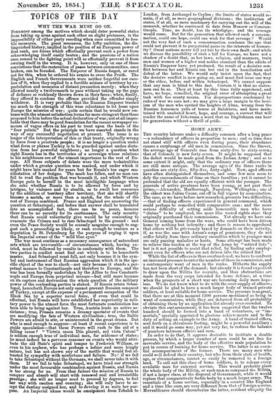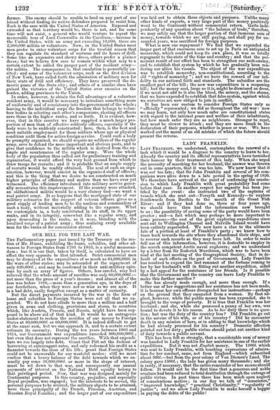HOME ARMY.
THE country labours under a difficulty common after a long peace- -a redundancy of officers in proportion to men; and as time does not stand still with officers even during peace, their abundance causes a surplusage of old men in commission. Since the Brevet, the average age of Generals rose from sixty-five to sixty-seven; that of Colonels is now forty-seven. It might be supposed that the defect would be made good from the Indian Army : and so to some extent it might, only that the ordinary run of officers there are still more antique. The average ages of the three ranks in question are sixty-five, fifty-five, forty-eight. Now, aged officers have often distinguished themselves, and some few men seem to defy the encroachments of time on their faculties ; yet it cannot be pretended that the old are equally efficient with .the younger. The generals of active greatness have beenyoung, or not past their prime —Alexander, Marlborough, Napoleon, Wellington; one of the oldest was Julius Caesar, cut off in full vigour by assassination. The case, as we have before now remarked, presents two difficulties, —that of finding officers experienced in general command, which could perhaps be remedied with comparative ease; and the more serious difficulty of setting aside honourable men who have "claims" to be employed, the more like vested rights since they originally purchased their commissions. Yet already we have one General coming home from the wars, who could have been driven home by nothing but infirmity; and there is reason to apprehend that others will be grievously taxed by demands on their activity, if, as was the case with Anson's corps of pensioners, they do not suffer fatally from those ordinary casualties which to younger men are only passing maladies or hurts. Some attempt has been made to relieve this burden at the top of the Army by "retired lists"; but is it not possible to assist that relief, by finding safer employ- ment even for officers who are not driven into the retired list.
While the list of officers is thus overburdened, we have to confront an increased pressure to enter the number of those in commission, and a contemporary want of men in the ranks. Hitherto the supply has not been short of the demand; but already it is found expedient to draw upon the Militia for recruits, and thus abstractions are made from the very corps intended for home defence, at a time when the prospects of a short war are becoming daily more hope- less. We do not know what to do with the over-supply of officers • we should be glad to have a much larger body of trained private soldiers, at least suitable for home service. The pressure is so great, that there are at this moment 1200 persons mentioned as being in want of commissions, while they are debarred from all probability of obtaining them by an application-list already over-crowded. To obviate this embarrassment, it has been suggested that the twelve hundred should be formed into a band of volunteers, or "im- mortals," specially appointed to glorious achievements and to the duty of setting an example to the Army. A band of trained Tillers, sent forth on a chivalrous footing, might be a powerful auxiliary ; and it would go some way, yet not very far, to redress the balance of numbers between officers and men.
In order to do that, it appears desirable to institute a double process, by which a larger number of men could be set free for moveable service, and the body of the effective male population be put in course of training for home service. The latter is an essen- tial accompaniment of the former. There are many men who could well defend their country, but who from their state of health, age, or circumstances, cannot so easily be removed to a foreign land. To call out this class of home soldiers, is to release every available man for external service. This would probably place the whole body of the Militia, or such men as composed the Militia, if: ot a larger class, at the disposal of Government, while it would replete that comparatively feeble body by a much larger army. The essentials of a home service, especially in a country like England and a time like ours, are very different from that of foreign service. Moveableness shonld characterize the latter, resident ubiquity the former. The enemy should be unable to land on any part of our island without finding its native defenders prepared to resist him. Such is the case with the United States of America. Exposed and extended as that territory would be, there is not, and for some time will not exist, a general who would venture to repeat the memorable tour of Lord Cornwallis in the Carolinas,—because in the United States, with an army not exceeding 10,000, there are 2,300,000 militia or volunteers. Now, in the United States most men prefer to enter volunteer corps for the twofold reason that they can regulate its standard of costume and its hours of drill. Some like an expensive and showy dress, others prefer a plainer dress; but we believe few care to remain within what may to a certain extent be called the pauper part of the resident army— the militia. The consequence is, that emulation is powerfully ex- cited; and some of the volunteer corps, such as the first division of New York, have called forth the admiration of military men for their state of drill and efficiency. They have preserved the do- mestic peace of the State city-; and others of a similar class have gained the victories of the United States over enemies on the border, adding provinces to the Union.
In order, however, to obtain the full advantages of a volunteer resident army, it would be necessary to introduce something more of uniformity and of consistency into the government of the whole; leaving to the individual corps the freedom that belongs to volun- teer bodies in selecting each other's companions, electing all officers save those in the higher ranks, and so forth. It is evident, how- ever, that in this country we have supplied a much larger pro- portion of men than of effective soldierly officers, especially if the , body were to be suddenly constructed : here, then, is the best and most suitable employment for those soldiers whose age or physical condition unfit them for active foreign service. Could such a body be promptly organized, we should require no soldiers of the regular army, save to defend the more important and obvious posts, and to give that confidence to the militia which is derived from the ex- ample and countenance of the regular army. Were the whole body of the population thus called out for preliminary training and organization, it would afford the very best ground from which to draw troops for recruits ; and it is probable that an ample supply of recruits would be readily obtained. The soul of such an orga- nization, however, would consist in the organized staff of officers; and this is the thing that we desire to see constructed on much higher principles of efficiency and motive than we have ever yet witnessed. The efficiency introduced into military service gener- ally necessitates this improvement. If the country were attacked, an oldfashioned militia would be a very clumsy tool—we want a real patriot army. It so happens that the mortgaged state of our military estimates for the support of -veteran officers gives us a good supply of leading men to be the nucleus and commanders of such a body, without materially adding to the expense. What we contemplate is, a body constituted in its staff, in its upper ranks, and in its integrity, somewhat like a regular army, and upon despending in the ranks, as it were, blending with the localized corps of a patriot army ; thus realizing every available man for the ranks or for commission abroad.



























 Previous page
Previous page